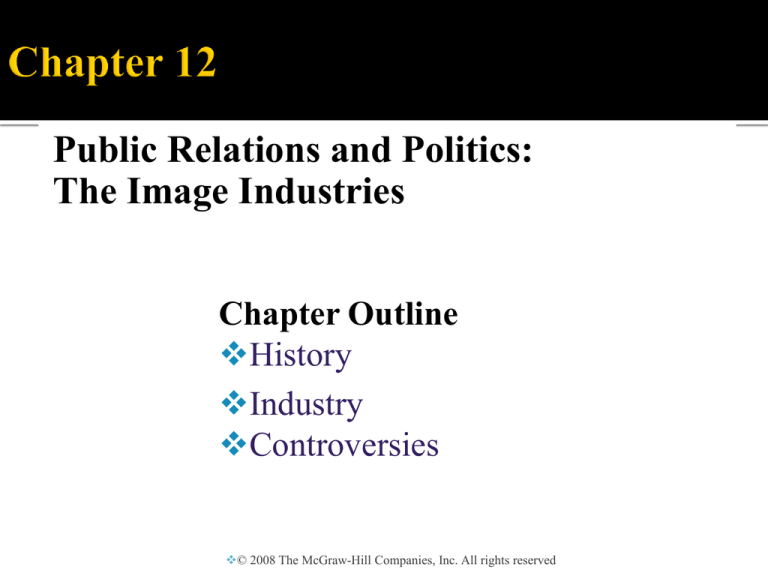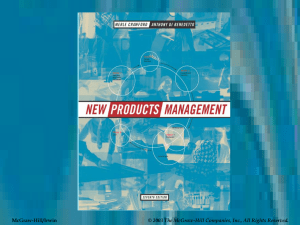
Public Relations and Politics:
The Image Industries
Chapter Outline
History
Industry
Controversies
© 2008 The McGraw-Hill Companies, Inc. All rights reserved
Public relations is
▪ The art or science of establishing and promoting a favorable
relationship with the public.
Public relations is different from advertising.
Can anyone tell me how these two things are
different?
© 2008 The McGraw-Hill Companies, Inc. All rights reserved
Both public relations and advertising, however, are
persuasive endeavors and work together in
integrated marketing.
Internal publics
▪ Those within the client’s organization and include
employees, stockholders, and members.
© 2008 The McGraw-Hill Companies, Inc. All rights reserved
Precursors of Public Relations
People have always had opinions and others have always tried
to influence those opinions.
▪ Ancient Greeks hired Sophists to help fight their verbal
battles in public forums.
© 2008 The McGraw-Hill Companies, Inc. All rights reserved
Precursors of Public Relations
▪ Ancient rulers employed spies to keep in touch with public
opinion and spread favorable rumors
▪ Most people in the colonies were indifferent to the cause of
American independence.
▪ Patriots used PR techniques, such as the Boston Tea Party of
1773, to gain public support for the war.
© 2008 The McGraw-Hill Companies, Inc. All rights reserved
In the new U.S. quick-witted people from sideshow barkers to
Broadway press agents worked to generate publicity for their
clients.
The dramatic means they used was known as hype.
▪ P.T. Barnum planted stories filled with lies about his
attractions,
▪ Named his circus “The Greatest Show on Earth.”
▪ What are some recent examples of “HYPE”
today?
© 2008 The McGraw-Hill Companies, Inc. All rights reserved
▪ In the 1800s, public relations techniques were used by
▪ Land speculators and railroads to entice people west with glowing
reports of fertile land and cooperative natives.
▪ The railroads encouraged the westward migration
▪ Why would railroads want people to move west?
© 2008 The McGraw-Hill Companies, Inc. All rights reserved
A popular eatery that you enjoy has caused
numerous people to get sick,
Local authorities say its due to undercooked or
tainted meat
This has resulted in the death of two children
Would you still eat there? Why/Why Not
What would have to happen in order for you to go
back or continue eating at the restaurant?
© 2008 The McGraw-Hill Companies, Inc. All rights reserved
Public Relations As a Profession
Ivy Ledbetter Lee
▪ The father of the modern public relations industry.
▪ A former newspaperman, he was hired in 1906 to rebuild the tarnished
images of U.S. coal mine owners, including John D. Rockefeller.
Lee believed that the goal of public relations was not to fool or
ignore the public.
▪ Often credited with being the originator of modern crisis communications
© 2008 The McGraw-Hill Companies, Inc. All rights reserved
Edward Bernays coined the term
▪ “public relations counsel” in his book, Crystallizing Public Opinion,
He also taught the first university public relations course at
New York University.
© 2008 The McGraw-Hill Companies, Inc. All rights reserved
FDR established the Office of War Information
▪ Promoted WWII bonds, encourage work productivity and the
rationing of food, clothing, and gasoline.
© 2008 The McGraw-Hill Companies, Inc. All rights reserved
The FBI’s “Ten Most Wanted Fugitives” Program
▪ Started off as a reporter’s request to name their most-wanted fugitives.
Subsequent positive publicity after the story culminated into
the “List.”
© 2008 The McGraw-Hill Companies, Inc. All rights reserved
Today, countries with expanding economies such as
Korea and some countries of the former Soviet union,
▪ Hire PR firms to improve the perception that international investors
have of them.
© 2008 The McGraw-Hill Companies, Inc. All rights reserved
After September 11th, 2001 attacks on the U.S.
▪ Our government established media specifically designed to sway
anti-U.S. sentiment in the Arab media:
▪ “Al Hurra” is a slickly produced Arab-language cable
television network.
▪ Radio Sawa is an Arab-language radio service.
▪ Radio Farda is a Farsi-language radio service.
▪ Hi Magazine is a geared towards Iraqi elites.
© 2008 The McGraw-Hill Companies, Inc. All rights reserved
After poisoned Tylenol capsules in 1982,
▪ President of Johnson & Johnson and company execs had a
teleconference,
600 reporters in 30 cities
▪ Allowed the company to explain the extraordinary precautions that
Johnson & Johnson was taking to protect consumers.
© 2008 The McGraw-Hill Companies, Inc. All rights reserved
News reports indicate that there is a spike in
muggings and assaults at the local
community college
You find out several students were robbed at
gunpoint after an evening class
You are in charge of developing a solution to this
problem and calming community outcry
What are some things that you can do?
© 2008 The McGraw-Hill Companies, Inc. All rights reserved
PR Activities
Research that occurs through the public relations process is used
to:
▪ define problems,
▪ identify publics,
▪ test concepts,
▪ monitor the progress of a campaign,
▪ evaluate its effectiveness when it is over.
PR practitioners are involved in decision-making and
organizational policy-making of companies and politicians.
This includes
▪ Coaching clients on how to behave in an interview, offering grooming
advice or teaching how to avoid answering direct questions.
© 2008 The McGraw-Hill Companies, Inc. All rights reserved
PR Strategies
News management techniques include:
▪ publicity stunts to create human-interest stories,
▪ creating news hooks to interest media gatekeepers in the
information that clients want to publicize,
▪ developing media relations, or press relations, that
maintain contact with reporters,
▪ using leaks and trial balloons to test public reaction to a
major policy,
▪ granting exclusives to just one news outlet to increase the
impact of publicity.
PR maintains good community relations by giving corporate
aid to schools, charities and nonprofits.
© 2008 The McGraw-Hill Companies, Inc. All rights reserved
Crisis management
▪ Is the action used to repair a client’s public image following an
emergency, such as a major error, accident, or sabotage.
E. coli poisoning leads to Odwalla juice recall (1996)
Wendy's restaurant patron found finger in bowl of chili (2005)
Multi-State Outbreak of E. coli Infections From Spinach (2006)
Companies will use PR Agencies to calm the public and attempt
to restore trust in their products/services
▪ What company is currently working to repair their tarnished image?
© 2008 The McGraw-Hill Companies, Inc. All rights reserved
Lobbying is any attempt to influence the voting of
legislators.
▪ The name comes from the practice of PR representatives
speaking to lawmakers in the lobbies outside their hearing
rooms.
▪ U.S. companies spend hundreds of millions of dollars annually
in their lobbying efforts.
▪ Multi-million dollar industry associations are set up purely for
the purpose of influencing how laws are written.
© 2008 The McGraw-Hill Companies, Inc. All rights reserved
Some Public Relations Tools
Press releases, or news releases, are short documents, written
in standard news form, for insertion into news reports.
▪ Canned news and editorials are digital files to be inserted
verbatim into feature or editorial sections.
▪ Audio news releases include interviews and sound bites
ready for insertion into news reports.
▪ Video news releases (VNRs) are ready-to-broadcast tapes.
▪ For example, a drug company might distribute a VNR that provides
interviews with experts who have developed and tested a new drug
along with satisfied users.
© 2008 The McGraw-Hill Companies, Inc. All rights reserved
You are the account executive in charge of a
new account
The client wants to generate a buzz for their new
shoe line
You don’t have enough money to run ANY ads
What are some things you can do to get the word
out?
© 2008 The McGraw-Hill Companies, Inc. All rights reserved
Some Public Relations Tools
VNRs have become controversial in recent years,
▪ Often called Fake News, when used without attribution.
A 2006 Center for Media Democracy study
▪ Found 36 VNRs that had aired on 77 stations.
© 2008 The McGraw-Hill Companies, Inc. All rights reserved
The Ethics of PR Tactics
Many PR professionals and journalists have a “love-hate”
relationship.
Neither respects the other’s job yet they need each other.
Journalists call PR people “spin doctors and “flacks,”
▪ Derives from the term for WW II anti-aircraft fire.
spin is
▪ Providing an interpretation of an event or campaign
▪ Persuading public opinion in favor or against an organization
or public figure
© 2008 The McGraw-Hill Companies, Inc. All rights reserved
The Ethics of PR Tactics
To some, spinning is the practice of twisting the truth so that
what is said puts the best possible face on the facts.
▪ Critics contend that most spinning is a type of lying, or a half-truth at
best
“The Big Lie” occurs when people state something they know
to be untrue and stick to it
▪ In spite of all evidence in the hopes that the press and public will become
confused by the issue and forget about it.
© 2008 The McGraw-Hill Companies, Inc. All rights reserved
Greenwashing
Covering up environmental problems caused by the client by
associating that client with beneficial environmental actions.
Many critics believe that freebies
▪ Including junkets, meals, and gifts designed to curry favor with reporters
and magazine writers, amount to bribes.
© 2008 The McGraw-Hill Companies, Inc. All rights reserved






